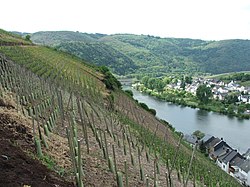
Back Terrer Catalan Terroir Czech Terroir Danish Terroir German Τερουάρ Greek Terroir Spanish Terroir French טרואר HE Terroir Croatian Terroir Italian

Terroir (/tɛrˈwɑːr/; French: [tɛʁwaʁ] ⓘ; from terre, lit. 'lands') is a French term used to describe the environmental factors that affect a crop's phenotype, including unique environment contexts, farming practices and a crop's specific growth habitat. Collectively, these contextual characteristics are said to have a character; terroir also refers to this character.[1]
Some artisanal crops and foods for which terroir may apply include wine, cheese, coffee, single malt whisky, onions, and tea.[2]
Terroir is the basis of the French wine appellation d'origine contrôlée (AOC) system, which is a model for wine appellation and regulation in France and around the world. The AOC system presumes that the land from which the grapes are grown imparts a unique quality that is specific to that growing site (the plants' habitat). The extent of terroir's significance is debated in the wine industry.[3]
- ^ Tanzer, Stephen. "What is terroir?". Stephen Tanzer's Winophilia. Archived from the original on 24 July 2015. Retrieved 23 July 2015.
- ^ Ducarme, Frédéric (2025). "The Ecology of the "Terroir" What Can an Old French Concept Bring to Modern Relationships to the Land?". Environmental Ethics. 47 (1). doi:10.5840/enviroethics20252395.
- ^ Robinson, J., ed. (2006). The Oxford Companion to Wine (3rd ed.). Oxford University Press. pp. 693–695. ISBN 0-19-860990-6.
© MMXXIII Rich X Search. We shall prevail. All rights reserved. Rich X Search